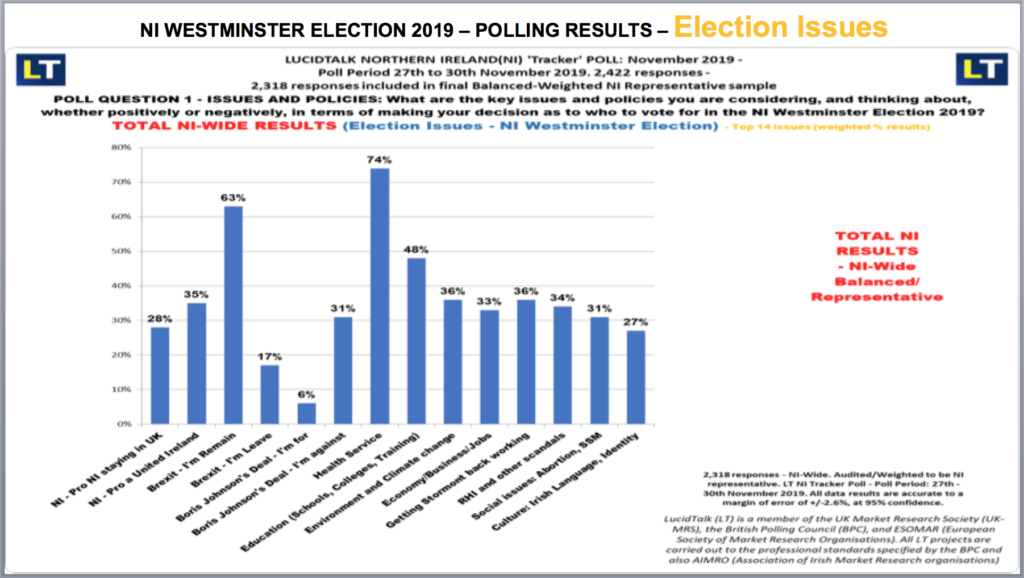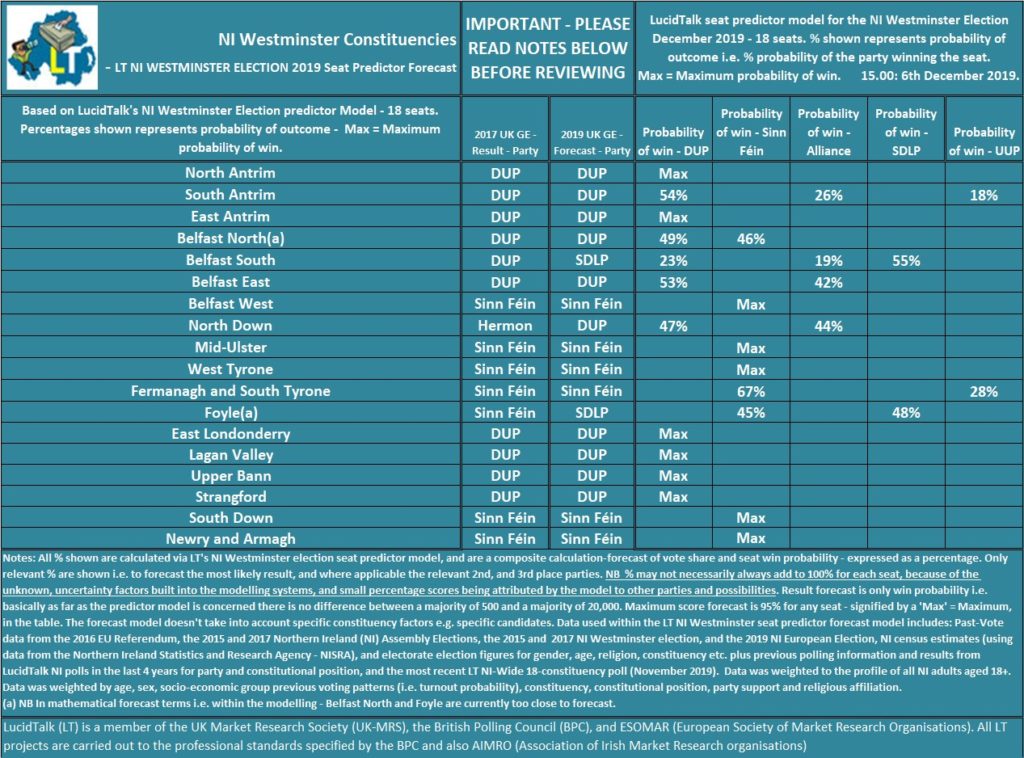What will the voters of Northern Ireland prioritise when they go to the polls on Thursday?
With a new round of talks due to start the Monday after the election, how likely are we to see any significant shifts in our overall political impasse after nearly three years without devolved government?
And as the national race appears to tighten in its closing stages, what will the range of potential outcomes mean for the future here?
These were just some of the questions up for discussion at this week’s event, ‘Making Sense of the 2019 General Election’ at the Dark Horse in Belfast’s Cathedral Quarter, chaired by Northern Slant‘s Michael Avila, with a distinguished panel of commentators and a packed house of interested and engaged potential voters.
The event was organized in partnership with PR and marketing agency Lighthouse Communications and polling organisation LucidTalk.
Kicking the evening off, LT’s managing director Bill White ran us through some of the possible permutations for the Northern Ireland seats, but firstly presented results of polling showing which issues our local electorate is most concerned with. Perhaps unsurprisingly, Bill said, the Health Service came out on top, across all categories of voter; ahead of constitutional issues and Brexit. Education also scored highly across the board among voters’ concerns.
When it came to the likely outcomes for Northern Ireland’s 18 Westminster constituencies, LT’s polling indicates four seats which could be set to change hands – North Down and Belfast South, with Belfast North and Foyle currently too close to forecast.
* Full details of LucidTalk’s main pre-election tracking poll can be found here.
Orange and green, again?
Despite the polling numbers on the issues of most concern, Alex Kane commented that, for 95 per cent of the people voting on Thursday, health – or even Brexit – wouldn’t actually prove to be the real motivation. “Whatever people may be thinking about: remain or leave, health or the environment, it will still come down, in a vast majority of cases, to orange and green.”
“In every election in Northern Ireland, when we sit down and look at the figures, the only thing that matters is how many unionist MPs have been elected and how many non-unionist MPs have been elected. And why that’s particularly important in this election is that if you look at 2017, unionists lost their majority in the Assembly for the first time ever. They lost the majority in the Belfast City Council years ago, and they lost their second MEP a few months ago.
“So if you reach a situation now, 18 months before the centenary of Northern Ireland’s existence, where figures are ticked off the following day and people can say unionists no longer send a majority of MPs to Westminster and no longer represent a majority in the Assembly or Belfast City Council, so why can’t we move to a border poll now; that’s why when people come to vote – especially on the unionist side – every other issue doesn’t actually matter.”
On the prospects for each party after Thursday, Daithí McKay said that all the parties will have something to take away from the election, but while a first past the post system continues to favour the DUP and Sinn Féin, the big story of the year so far has been the Alliance vote and how the “mood music” has changed going into 2020 and what that means for any possible restoration of the Assembly. Especially, he said, if the public looks at who’s to blame for problems with the health service and ends up saying “a plague on both your houses.”
“So there will be pressure on the big parties to get the details right [for any restoration of the Assembly] and most importantly to be able to sell it. I don’t know if that is going to happen but the chances have increased significantly.”
The election has constantly been held up as the “Brexit election” and Lisa Whitten thinks that’s only partly true. “It is the Brexit election, but also for Northern Ireland specifically, the elephant in the room is that we haven’t had a devolved government here, so parties running a campaign off their vision for the health service is going to ring a bit hollow because we can’t implement that until we get Stormont up and running. But this is the election that will decide Brexit, even if there’s a lot more Brexit to be discussed yet, particularly in terms of constitutional questions.”
Elodie Fabre pointed to the recent increase in voter registrations and the importance of turnout, but said that voter frustration can also be a big factor, hence slogans like ‘Get Brexit Done’.
“It’s always difficult to assess the impact of frustration: you can have two completely different impacts. One is ‘I hate them all and I want them all to lose’. On the other hand, nationally we can see the conservatives really trying to use that frustration to mobilize the electorate and that could increase turnout. An increase in registrations doesn’t necessarily mean that everyone who registers will go to the polling station, but it suggests there is interest in the election. And therefore that could lead to a higher level of turnout if people think their action will get Brexit done or not, so the stakes are very high.”
For Kingsley Donaldson, there are always some underlying difficulties with polling a national election and drawing specific conclusions.
“In the mainland polling is awkward because there’s a big geographical spread to try to cover and a huge range of issues that are geographically acute, that are not necessarily captured by the media outside the M25. There are a lot of issues where messaging isn’t coming through clearly to people who are undecided, and therefore you’re left with a kind of a personality race towards the end. The polls don’t really pick that up because they’re asking very nuanced questions about policy specific issues, so often you don’t get clarity.”
On the outlook specifically for the Northern Ireland seats, Kingsley said: “It’ll be interesting to see in South Belfast, East Belfast, and places like North Down, whether the Alliance “surge” will continue because one of the reasons the party put forward for standing in all the seats is that the only way to measure a surge you’ve had is to stand in every seat. But my own gut instinct is that Alliance could take a hit in this election, which in turn would have a knock-on effect when they get into talks the following Monday.”
As for how the audience saw things unfolding on Thursday, Lucid Talk’s closing electronic poll question in the room asked how people “feel” about the election from a range of descriptions. There are some interesting splits by age group. Here’s the – again, probably predictable – outcome…
E-Poll Q results from last night's audience at the @NorthernSlant pre-election event (sponsored by LT and @lighthouseni) – "Outlook for NI, How do you feel?", analysed by age-group – Fearful, Concerned, Frustrated are the big feelings, but young people are a bit more positive! pic.twitter.com/7TDgFCj3l4
— LucidTalk (@LucidTalk) December 10, 2019


